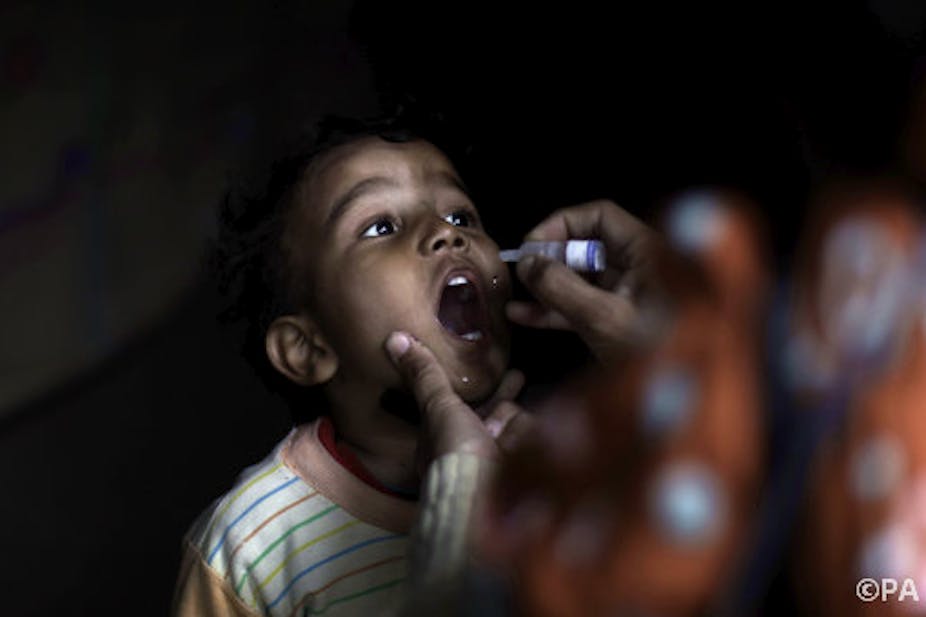The World Health Organisation has launched a huge immunisation programme to tackle the first suspected cases of polio in Syria for 14 years. War in the country has seriously affected health services and immunisation programmes and suspected polio in 22 children has led to the urgent vaccination of 2.4m more.
It comes fast on the heels of World Polio Day, when organisers hope to celebrate success in world eradication programmes and raise support for the final inch – the difficult but relentless assault on polio in its last shrinking refuges inside Pakistan, Afghanistan and Nigeria.
Despite the huge push to get rid of polio, its eradication is judged to be at a tipping point between success and failure, with some estimating that failure could lead to a widespread resurgence within a decade. And the cases amid the Syrian crisis and another new epidemic in Somalia show eradication of this dreadful disease, which can lead to paralysis, is far from an easy task.
A major setback
At the start of this year, the battle seemed truly on the brink of success. Since 1988, more than 2.5 billion children have been immunised against polio through the Global Polio Eradication Initiative (GPEI). This great endeavour has taken place in more than 200 countries, helped by 20m volunteers. Cases in 2012 totalled just 223. And in the first three months of 2013 there were fewer than 100 cases globally.
In 2009, GPEI instituted a three-year strategic plan: an aggressive, time-bound strategy with measurable milestones to banish polio once and for all. This plan now includes a target of 80-85% immunisation levels in Africa and 95% in Asia — levels estimated to be sufficient to stop polio transmission.
But dreams of imminent eradication were dashed after polio appeared in Somalia in April, a country that had been free of polio since 2007. The Banadir region of Somalia, which includes a Mogadishu refugee camp, is thought to be where polio regained its hold. And the virus spread rapidly to Kenya, Ethiopia and Sudan.
There are a number of reasons, aside from conflict, why polio persists. For example, early in the new century, many in the north of Nigeria, the last African country harbouring endemic polio, believed the polio eradication initiative was a western plot to sterilise Muslims and that the vaccine contained anti-fertility drugs and cancer-causing viruses. Muslim leaders condemned it and polio cases climbed tenfold.
But after the leaders of Nigeria’s 70 million Muslims united in support of the campaign in 2010, the campaign’s larger problems now have to do with logistics in remote tribal regions among nomadic peoples. Another problem was also highlighted by inspirational British paralympian Ade Adepitan, himself the victim of childhood polio, in a recent Channel 4 documentary. Converted Islamic authorities in the north of Nigeria are now enforcing polio vaccination so zealously it has created resistance to vaccination among ordinary families.
Somalia has been described as the engine of the current outbreak. But genetic analysis of the virus sweeping through the Horn of Africa, where the number of cases has now topped 200, suggest that it is most likely to have come from Nigeria. However, the WHO believes the virus can spread more easily in Somalia because continued conflict makes it difficult for vaccination teams to reach Somali children. The country has the largest number of unvaccinated children in East Africa and many families remain suspicious of Western outsiders.
Conflict complicates immunisation
In China, long free of polio, an outbreak imported from Pakistan spread rapidly in 2011. Three months and 43m doses of vaccine later China was polio-free again. In 2010, Tajikistan suffered an outbreak. Its 460 cases outnumbered the total in the rest of the world. The epidemic was brought to an end within three months.
It will be harder in Somalia – a land beset by political turbulence and conflict - and now Syria, another country being ravaged by conflict.
However, eradication was achieved in Somalia in 2007 and the GPEI believes it can be achieved again. But it is clear that polio doesn’t remain isolated if outbreaks aren’t tackled and that war and conflict have the power to disrupt plans to rid us of the disease. If 2015 remains the target for the global defeat of polio, we will need to think about the children also caught up in conflict zones.

